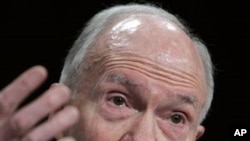The war in Afghanistan continues to be at the top of President Barack Obama’s foreign policy agenda. In this report from Washington, Senior Correspondent André de Nesnera spoke with former National Security Adviser General Brent Scowcroft about the conflict, now in its 10th year.
The United States has 97,000 troops in Afghanistan. The latest U.S. strategy review on Afghanistan says American forces will begin a scheduled drawdown next July - but the exact extent of the drawdown is not known. The goal is to hand over combat operations to the Afghan security forces by the end of 2014 - if the situation permits it.
U.S. Vice-President Joe Biden emphasized that point during a recent news conference in Kabul with Afghan President Hamid Karzai.
"Hopefully, we will have totally turned over the ability to the Afghan forces to maintain the security of the country," said Vice-President Biden. "But we are not leaving if you do not want us to leave."
Former National Security Adviser retired (Air Force) general Brent Scowcroft says the current U.S. strategy is right for the country.
"But the question is whether or not we have the resources to implement it within any timeframe that we have available to us," said Brent Scowcroft. "It is a counter insurgency strategy which has been changed somewhat from the counter terrorism strategy. So it involves clearing the Taliban - the bad guys - from areas and holding them while you reconstruct local government and local security."
Scowcroft says the problem has been holding those areas after clearing them of Taliban forces.
"As soon as we leave, bad people come back in," he said. "But holding them requires additional forces and that requires training Afghan troops to be able to move in and hold the areas that we have cleared. Now do we have enough force both with our forces and trained afghan troops to be able to make that work - that is the big question."
Earlier this month, the Defense Department announced it will send an additional 1,400 Marines to shore up gains, especially in the southern Kandahar region, a Taliban stronghold.
On another issue, many experts question whether Afghan President Karzai is up to the task and is a reliable partner for the United States. General Scowcroft says Washington has little choice.
"We have had problems with him from the very beginning," said Scowcroft. "It is a question we can not do much about because he is the president of the country and we are going to have to deal with him. We have a common interest and that is if we do not succeed, he does not succeed. But he does not have all of our interests at heart, he has his own interests at heart. And we just have to live with that difficult situation."
Karzai’s government has been accused of widespread graft and corruption. General Scowcroft says it would be a difficult task to root it out and probably is beyond Washington’s capability.
"It is corruption, but there is a different sort of cultural aspect to it, because one of the first responsibilities in that world is to take care of your family," he said. "So if you get a good job in the government, you use it to take care of your family. And so it is corruption, but it is not always exactly the same motivation as ours. But it is a huge problem."
The former national security adviser says one way to fight corruption would be to focus on the opium poppy cultivation.
"It is always been a mystery to me why we have not investigated buying the poppy crop instead of trying to destroy it and therefore destroy the living of the people who grow the poppies," said Scowcroft. "The poppy economic structure of the country feeds the corruption."
Experts say Afghanistan produces 85 percent of the opium in the world.
Looking ahead, many analysts are debating what kind of country Afghanistan will evolve into. Scowcroft says in the final analysis, the United States should not try to build a modern nation state.
"Afghanistan has from time immemorial been a loose collection of local tribes, interest groups, presided over by a very weak central government," he said. "We ought not to take that on. That is the way Afghanistan has been and for us to transform it would be too big a task."
Brent Scowcroft says as the United States begins its withdrawal from Afghanistan, followed by some European allies, the American public will demand answers to such questions as why are we there and what exactly are we doing in that country? And whether it was worth it in human losses and monetary costs.
Former National Security Adviser Scowcroft Discusses Afghanistan




